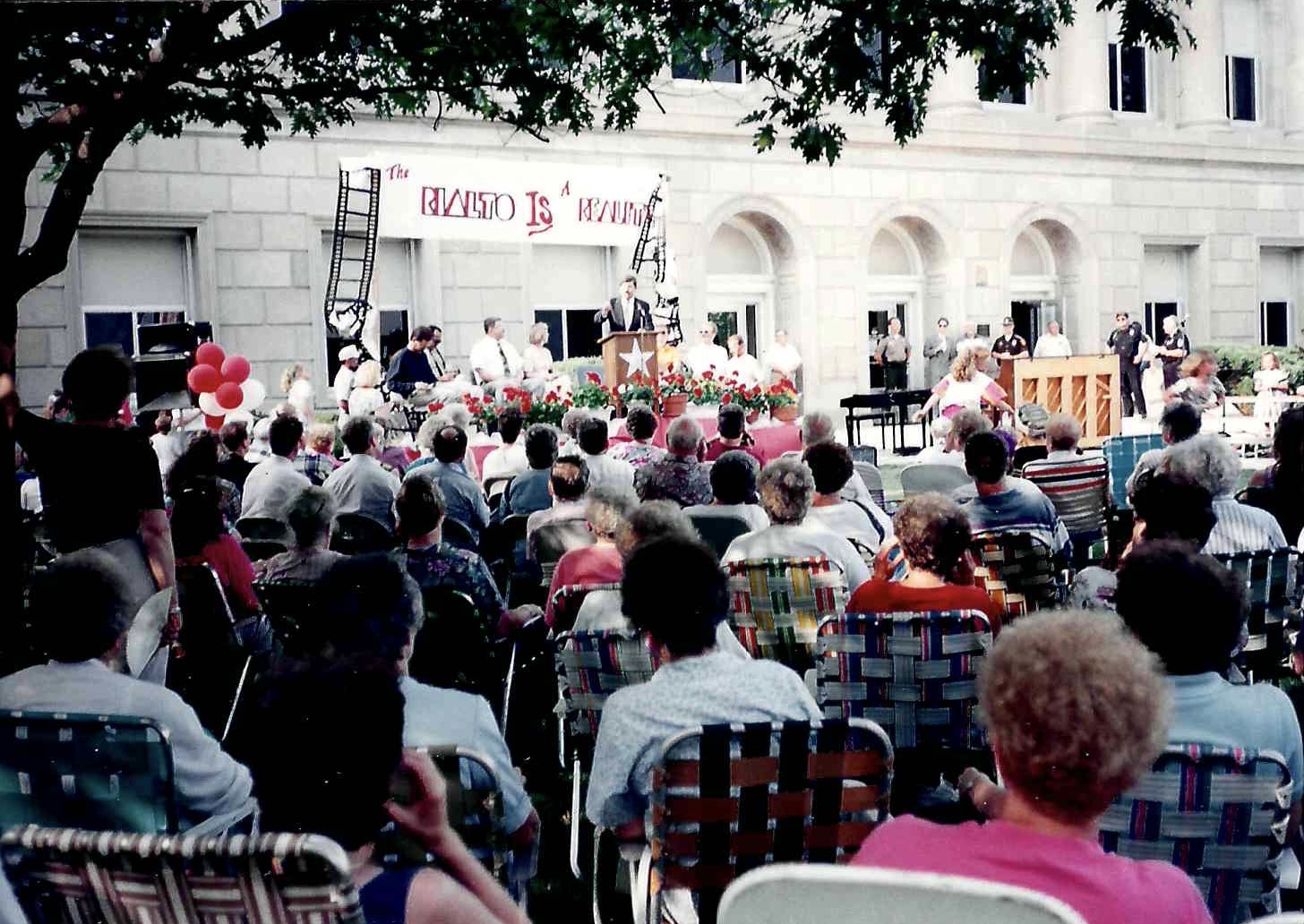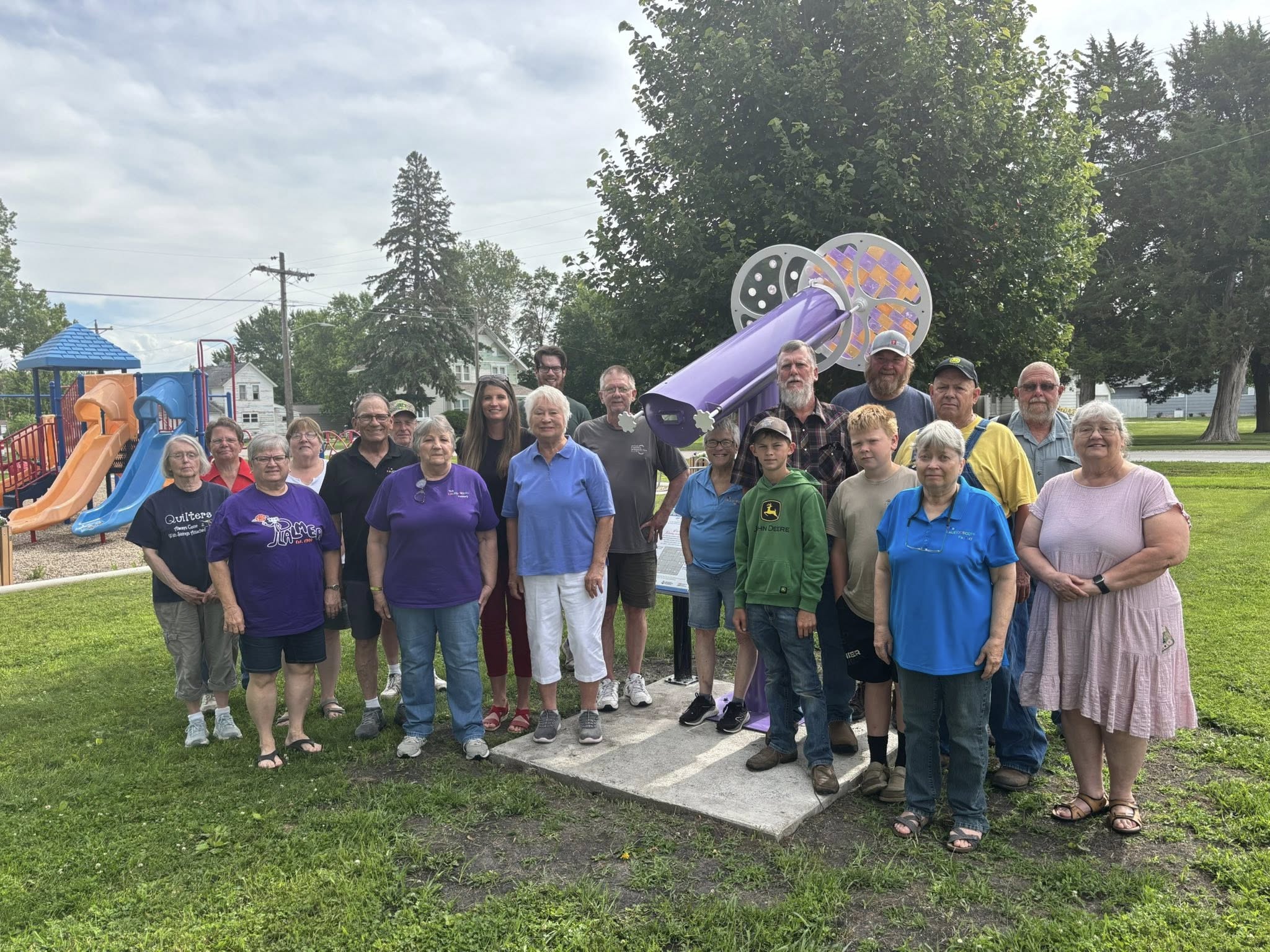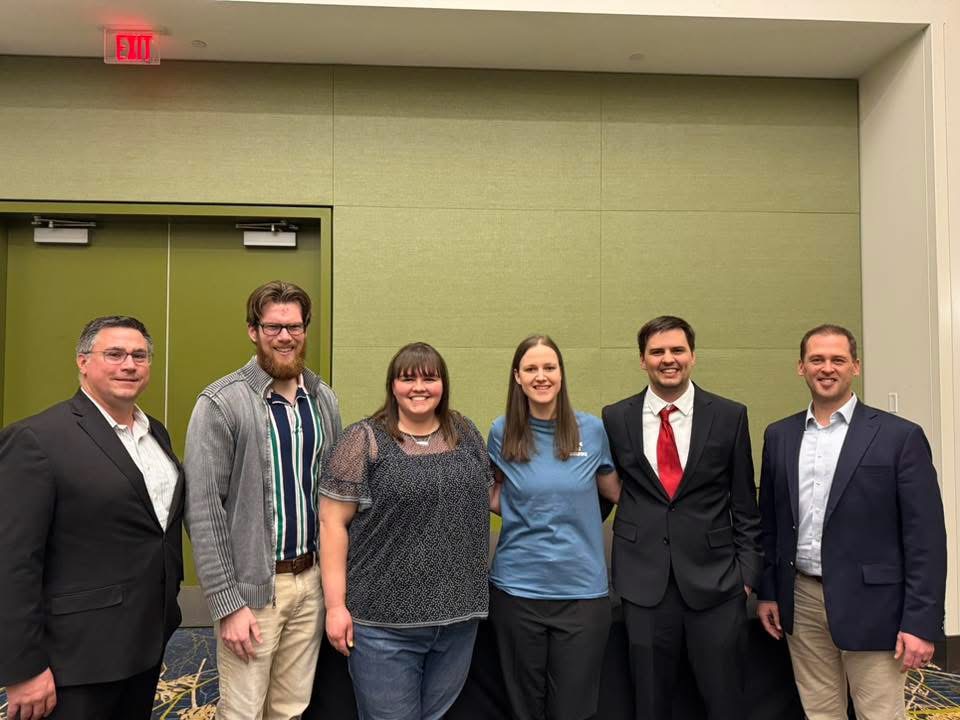
Quality of Life Story: The Pride is in the Tradition for Mock Trial in Pocahontas County
This story was originally in the special mock trial section of the April 9th 2025 edition of the Record-Democrat newspaper as “Mock trial’s legacy endures through the decades — and alum and helping programs grow” and was written by Erin Sommers. Special thanks to the Record-Democrat for letting us share this story!
PAC Coach Melanie Hardman likes to teach her mock trial students the PAC motto: “The Pride is in the Tradition.”
That pride and that tradition were on display at the 2025 Iowa State Mock Trial Championships last month, when four of 32 teams were coached by Pocahontas Area Community alumni.
Hardman said she was humbled and amazed to make that connection.
“Not big-name attorneys, not coaching staff with every resource at their fingertips, just alumni that had been impacted by this activity through the tradition of Pocahontas and had a passion to pass the experience on to another generation. I once again witnessed our slogan of ‘The Pride is in the Tradition.’ To think that this competition is influenced by a program in small-town Iowa makes me really proud that we work through obstacles to continue making this possible for our students.”
Hardman said she was incredibly grateful to Tim Magill for starting this program and “encouraging many students along the way to believe that big opportunities can come from a small town. It’s so fun to be part of a larger family of Pocahontas Mock Trial Alum.”
Hardman was on the 2014 PAC team that won state, and she was back helping coach that fall.
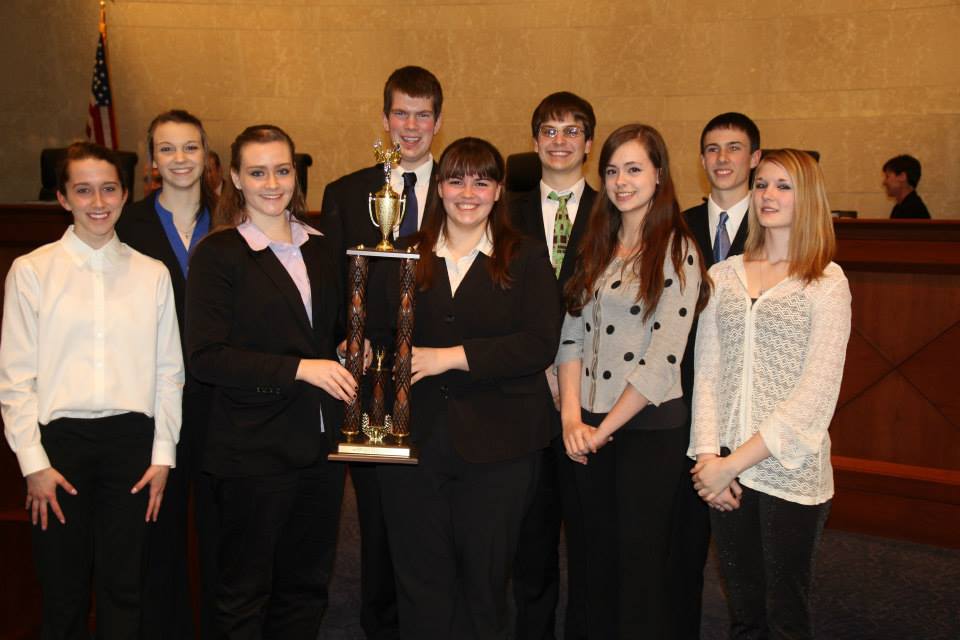
“I was greatly impacted by my own coaches, my teammates, fun memories created, and skills gained through mock trial,” she said. “I did not want to be done with it because I saw the value in it. Through my college years, I would come home every weekend to help coach the mock trial teams. The experience of coaching was even a major reason I changed my major to elementary education.”
She brought in Parker Aden, after she was coaching three teams, trying to keep them going on her own.
“It is such a joy to get a unique group of kids together that have fun together, make new memories, and work hard to accomplish their goals,” she said. “I love laughing with them, encouraging them, believing in them, and watching them shine as the wonderful people they were created to be. Mock trial is unlike any other activity, and I enjoy providing this opportunity for students that made such an impact on my own life. It is definitely my favorite thing I get to be a part of.”
Watching students grow into their potential is the best part of mock trial, Hardman said.
“Each of them has unique abilities and skills, and I love encouraging them to discover these talents and grow into them so they shine with confidence,” she said. “My favorite moment comes during the end of the state tournament every year when I can’t do anything to help the students anymore: like a proud parent, I just get to sit back to watch, listen, and be incredibly proud of their amazing growth. I get emotional when I think of all the students I have had the privilege of watching grow throughout these 10 years. It is truly a joy and my favorite thing I get to be part of.”
Aden said he sees plenty of lessons for students to learn as they compete in mock trial.
“Keep your head up because even when something doesn’t go your way, it’s more so about how you respond to it,” he said. “Whenever I judge I always tell the teams that during my verbal comments — I don’t score based on how I rule my objections, but rather if you can keep your composure when a good argument is overruled, or if one is sustained and you have to change your approach. There are so many life lessons to go along with it — confidence, public speaking, thinking on your feet — but I think the lesson of resilience is my favorite one.”
Over the years, he’s watched as students can be silly or crazy or even bothersome, but overall, he gets to work with great students.
“Mock trial takes a special kind of dedication, and so I get to work with kids that are incredibly talented,” he said. “I am so excited to see where the future takes each of them. I also enjoyed working with experienced and passionate kids this season. We’ve had some rebuilding years recently for our program, but with this year under our belt, I am so excited for next year.”
Aden started coaching while in college, accompanying PAC to the state tournament in 2019 to supervise the younger team that qualified. In the 2022 season, he said he was inspired to come back to coach. That year’s team was passionate and had a number of the freshmen he had worked with a few years earlier.
“Being down at state in 2022 reminded me how much I enjoy mock trial as an activity and the atmosphere of it,” Aden said. “At the state competition you don’t know if you won or lost until the end. The final four teams advance, and everyone else is sent home. You have an idea if you won or lost, but you don’t truly know until the awards at the end of the second day.”
Aden said he really enjoys working with the caliber of students who go out for and excel in mock trial.
“Mock trial is such a rigorous activity,” he said. “At certain points in the season, it feels like an additional class because of the task of memorizing parts and learning objections, etc. It takes a special kind of student to complete a season of mock trial. I also enjoy coaching mock because there are so many life skills students will learn along the way to help them in the future. You don’t always realize what those skills are right away, but you will as time goes on. It was in college when I was able to more easily realize those skills and be thankful for the impact the program had on me, so I enjoy being able to pay it forward and help coach the next generation.”
He said he hopes to see the students he’s coaching learn and follow through with those lessons.
“I hope they can see that not everything worthwhile in life is always easy, and you have to work hard/be dedicated to earn some of the things you want,” Aden said. “A lot of the kids we have in mock trial are also involved in other activities, and I hope they see the value of being multifaceted. We want them to succeed in mock trial, but we want to see them succeed in their other activities too. There is a balance where they can do both/all, and I think our students are able to recognize that. I hope their involvement in activities now carries with them past high school, because we need people to be involved and care about their communities. I think mock trial is a great activity for showing how connections can be built by putting yourself in situations to work on teams/be in a group that is working towards a bigger picture, AND being able to see multiple perspectives of a problem.”
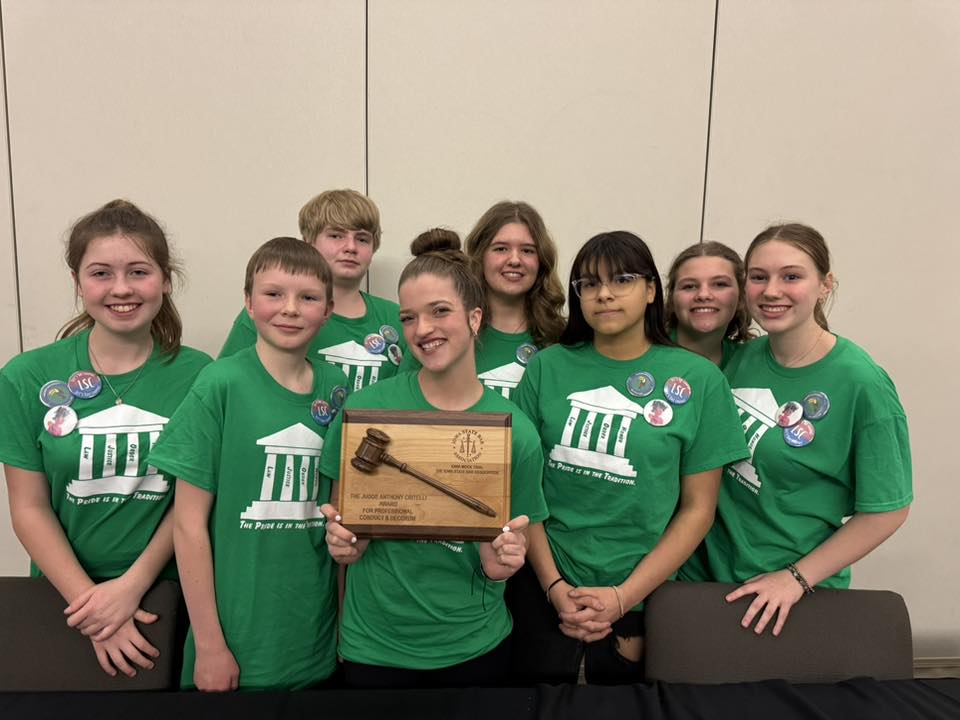
Nick Zaugg, a 1993 Pocahontas graduate, is a parent coach for the Mediapolis mock trial team. This was the first time the school has earned a state berth in 15 years.
Zaugg said mock trial was legendary when he was in high schoo.
“It was known as the academic sport and there was intense competition to try out and make the team,” he said. “In fact, there was so much interest that during my high school years Pocahontas began having two Mock Trial teams. My interest in mock trial was kept by the mental challenge it presented.”
Mock trial taught Zaugg lessons he still uses.
“Thinking quickly on my feet and giving a well reasoned, compelling and logical response is a necessary skill that I still use daily,” he said. “Part of my work responsibilities is to negotiate commercial real estate deals and large capital purchases. As I walk into a meeting to do a deal I am often still repeating coaching tips to myself that I picked up during mock trial.”
He works to impart those lessons and more to the students he works with now. Magill taught him to never ask a question in a cross examination he didn’t already know the answer to. Coach Sheldon Youngberg taught the students “it is amazing what incriminating answers witnesses will share when you ask with a smile.”
“And from Mr. John Smith, in response to some of our teenage deviance … ‘it is a shame that youth is wasted on the young,’” Zaugg said. “I find Mr. Smith’s words to be more hauntingly true as time passes.”
He said he sees several reasons mock trial is a good activity for students.
“Finding your voice and learning to think rationally is a key part of growing up,” he said. “Learning to see the other side’s point of view and being able to discuss it evenly is also an essential part of a functioning society. Mock trial is a place to learn and practice those skills. Public speaking, presenting and etc. can be learned well in other ways, but mock trial has the element of engagement with others who are pressing a different view of the facts; learning to manage that well is what is fantastic about mock trial.”
Zaugg said now, he sees something else notable about the program — it’s enduring legacy.
“It was special to be at the state Mock Trial competition and see that Pocahontas continues to have such a large impact on programs across the state,” he said.
Jeremy Hamp joined mock trial in junior high, in 1995, and continued through his graduation in 2000. He was drawn to the program watching his older sister, Amanda, compete.
“I loved the acting/performance side the witness role and knew that was the place for me,” Hamp said. “The tradition, the people, the pursuit of greatness, and the desire to win a state championship were high on the list of why I continued to participate.”
Hamp said he learned team building, collaboration, hard work, public speaking, critical thinking, and goal setting while in mock trial.
In 2014, he and his family moved from Pocahontas to Grimes, where he connected with a middle school mock trial coach.
“Learning her style and commitment to these kids made it very easy to join the coaching staff,” he said. “I was lucky enough to coach six seasons with her prior to my daughter hitting 6th grade and being able to compete. Coaching her and her team throughout middle school and seeing their passion for the program grow, along with their desire to become a formidable force in the state, easily draws me back to coaching year after year.”
This year, Hamp partnered with another coach to keep his daughter’s group together for their freshman season. The group made their fourth straight trip to the state tournament.
“Mock trial is not for the faint of heart — for both the kids, coaches, and parents,” he said. “The first year is so foundational to each student that comes out for mock trial. They are learning about how a courtroom works, professionalism and decorum, elements of the law, character development, performance styles, memorization, public speaking, and critical thinking. Working with 6th graders out of the gate, they are pretty overwhelmed with what all goes into the program. Finding strengths within each student and how they can leverage those as part of a team, is certainly an important element.”
Hamp worked with a number of PAC coaches, including the previously named Magill, Smith and Youngberg, as well as Sam Trumpold and Shari Nesbitt, as well as countless attorneys from the community.
“To be able to share the stories of the history of Pocahontas Mock Trial, the accolades, state championships, and national championships has certainly helped in keeping kids motivated and engaged,” he said. “As they gain confidence, see growth in their performance, and see results they desire, it makes it easy for them to come back year after year.”
Mock trial offers a lot for participants.
“The skills that are developed and refined over the years will follow any student well beyond the competitions they experience,” Hamp said. “The tangible skills — public speaking, critical thinking, writing, and performance — are invaluable. The friendships and bonds that are formed in a small group of people are impressive as well. Being able to watch these kids support one another and participate with one another in all their extra-curricular activities is special as well. Lastly, the bonds and connections that are made over the years between teams, both your own and the competition, is pretty unique.”
So many things make PAC mock trial special, Hamp added.
“The list is long — to have been coached by the teachers and attorneys of the community was incredible,” he said. “To see how former Pocahontas mockers have come back and coached teams post the Mr. Magill (et. al) era, is great as well. To be from a small town and competing against teams from across the state and doing so at the highest levels is no small feat. To this day, when I have the chance to say I was part of Pocahontas Mock Trial, people know how special that is. As we say, The Pride is in the Tradition – pretty incredible to have four teams at state this year that were coached by former mockers from Pocahontas.”
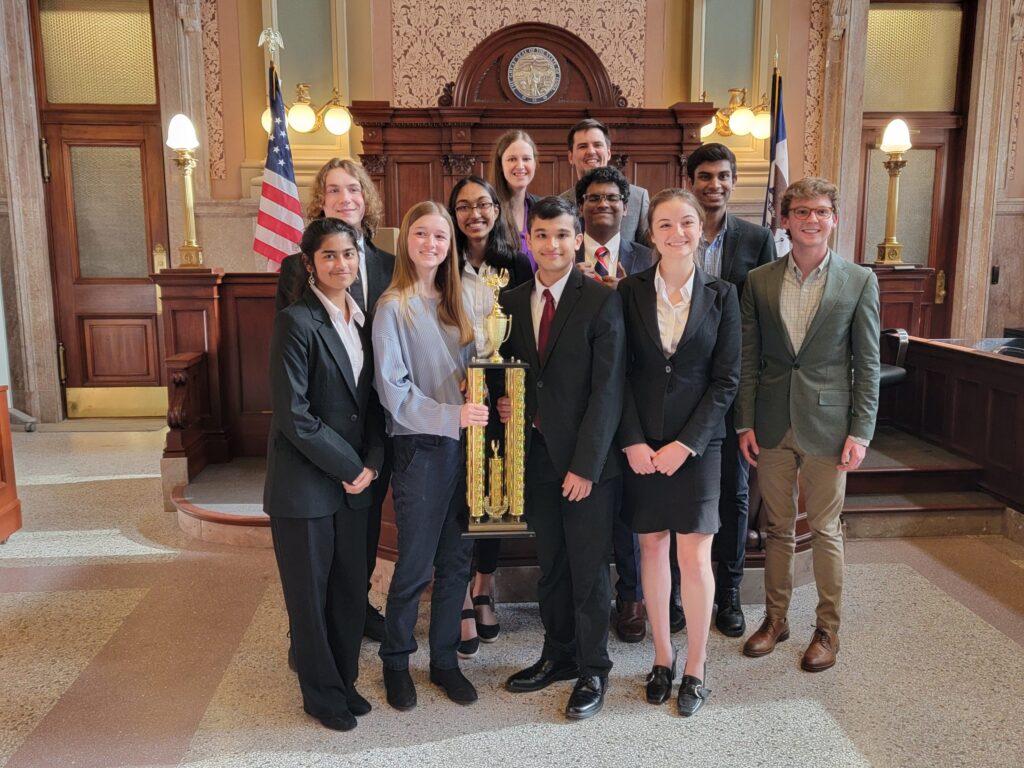
The fourth alum coach at state was Luke Peterson, who brought the Waukee team. Peterson joined mock trial in 2006 and was on the team through 2011. His sister was on a state championship team in the 1990s, and his friends were on the team, which drew him to the competition.
“I loved the challenge of figuring out a case and being able to argue points from both sides,” he said, adding that he learned “presentation, hard work and disappointment” while on the team.
He and his wife, Lindsey, began coaching at Waukee 10 years ago.
“Mock trial was my favorite activity as a student, so when I started teaching I knew that I wanted to pass it on and let my students have the opportunity to compete too,” he said. “Mock trial is hard. There’s a lot of things you have to be thinking about in order to perform well. But, being right doesn’t mean you win. So much of mock trial is persuasion, whether it’s persuading a judge or a witness. We were always told ‘it’s better to look smart, than be smart.’ Now, I prefer that my students are both, but it’s a different thought process than say school, where the right answer is what matters.”
There’s a lot of nuance in mock trial, he added.
“Mock trial is both very simple — talk better than the other team! — and very dense — understand the nuance of affidavits/exhibits/law/judging,” he said. “Having students be able to bridge both of those concepts is incredibly enriching for a student.”
Peterson said a few things stand out about mock trial, and about the legacy of the team at Pocahontas.
“Since mock trial is class-less, it shows kids from a small town that they can compete with students from large schools,” he said. “But more importantly, the tradition and legacy. Not many activities have both the breadth and depth of success of Pocahontas Mock Trial. Specifically for my wife and I, our family has had someone involved with Pocahontas mock trial for over 30 years! That’s very very special to me.”
There’s one more alum with a connection to this year’s state competition to note: PAC graduate Lars Hulsebus coaches mock trial at Simpson College and served as a judge at this year’s event.

